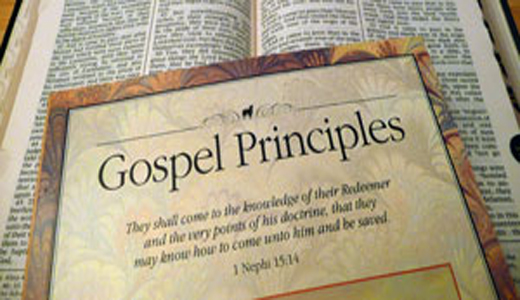
I just got ahold of some old Relief Society manuals. I thought it would be fun to go through them and see what the Relief Society used to discuss in their meetings. These manuals were used by my husband’s aunt and grandmother, so I was really perked and excited when I discovered notes written in the margins.
It was enlightening to read notes that had been made at the time of the lesson. For example, in the pages of a lesson taught on “Having Ears That Hear”, one of them wrote some proverbs that must have been used in the lesson. “Indian proverb: Listen or thy tongue will keep thee deaf.” Or, a bit of advice, “Ask an indirect question for a direct answer.”
In a lesson called, “What Is A Parent To Do? the notes say “What traits do you want in your children? Are you working toward those traits?” Another note reminds us that David O. McKay said, “Make your home a school”.
There was a lesson on “Priesthood Blessings”. Apparently, there was a story shared about a non-member visiting in Sacrament Meeting. He told someone that he saw a Deacon putting gum in the hair of the Deacon in front of him. This note is profound in its witness and example in just those few words.
In a lesson called “Encouragement—A Motivation That Works”, the note states, “When complaining about being tall and having bony knees, a father asked his girls, ‘Do they hurt?” Sometimes, we get off on tangents in our lessons, but I can see the relationship between encouraging one another and showing gratitude through our personal struggles. Also written in the margin is “Johnny Lingo”. There is just something about that classic story. Our young people just think it’s stupid and corny, but they are missing the value of the lesson, as well as the innocent quality of it’s humor. Another note must have been a comment made in class: “A discouraged sister wrote to her brother in the mission field. He wrote back and sent her a list of her titles—Member of ward, Citizen of the United States, etc.” Sometimes, we need to remind ourselves, or each other, who we are and what we are accomplishing.
Certain parts of the lesson are underlined. Underlining something usually means it is important to you, or maybe you want to go back and study it out more. These short phrases were found underlined in random lessons, “A study of Latter-day Saint church history is necessary that the fundamentals of the restoration of the gospel of Jesus Christ be known and appreciated.” “Read what is written in our scriptures.” “The Lord expects Latter-day Saints, his covenant people, to prepare for these future events so that they may not be overtaken by them in the day of desolation.” “Satan is making war against all the wisdom that has come to men…” “Remember that our personal records are the only ones compiled by family units.”
This last underlined statement struck me, because it reminds me that if we don’t write things down about our own family, it is lost forever. In the margin it says, “Daily record of children: Why are you scrubbing her hair?” and “orange ham”. What are the stories behind these comments????
It never occurred to me to write notes in my manual. We are encouraged to keep these books and use them as resource material throughout the years, but let’s be honest, do we do that?
If you wrote your thoughts and feelings in these books, would you be more inclined to refer to them? As a teacher, can you use and reuse thoughts and resources that have been shared in other lessons? Is the Spirit more likely to inspire you toward the direction you want to go if you write it down immediately? The answer to all of these questions is a resounding “YES”.
Consider writing down your inspirations, thoughts, quotes, etc. within the pages of your lesson manual. Transfer them to your journal, if you must, but by this small act, you etch profound thoughts that can be recalled, relearned, and relived in your future, as well as those who come behind.